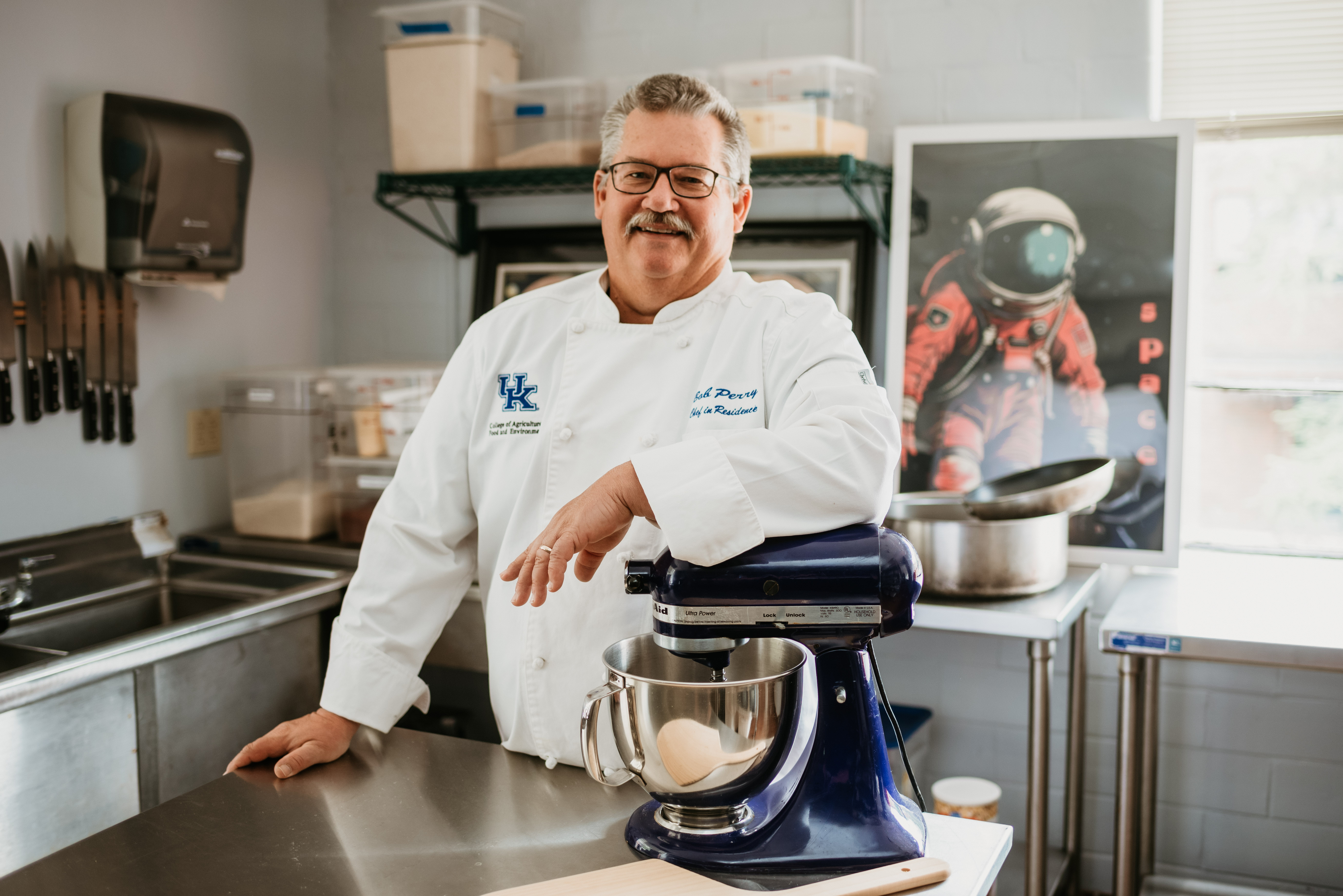UK chef helps pioneer the future of space food, from the Moon to Mars and beyond
UK chef helps pioneer the future of space food, from the Moon to Mars and beyond


In the spirit of exploration and the quest for knowledge, a new frontier awaits; one that takes humans beyond Earth’s confines and into the vast expanse of the cosmos. As space agencies prepare for long-duration missions and the challenges ahead, they must carefully consider a crucial aspect: the nourishment and sustenance of future space crews. In this vein emerges neurological gastronomy, also known as “neurogastronomy,” the study of flavor perception and how the brain uses all five senses to experience and remember food. The science behind it could vastly improve the future of space travel.
This is where University of Kentucky chef-in-residence Bob Perry comes into the picture. The campus chef works with Humanity in Deep Space revolutionizing food technology and creating a new narrative for food in space.

Perry said scientists face numerous technological challenges exploring and colonizing deep space. However, one aspect often overlooked is the human factor. Transitioning to deep space involves not only the complexities of exploration technology, but human food and nutrition as well.
“One of the primary concerns is the psychological impact on astronauts during long-duration space missions,” said Perry, UK College of Agriculture, Food and Environment food lab coordinator and a founder of The International Society of Neurogastronomy. “Through pioneering research and flight experiments, neurogastronomy explores various fascinating areas.”
Kris Kimel, founding member of Humanity and Deep Space, said the 300-million-mile journey to Mars takes approximately seven months in each direction. Explorers would spend an additional year researching the Red Planet before the return trip. This amounts to two and a half to three years away from Earth. The uncertainties surrounding the human experience in such prolonged deep space missions are immense. Factors like nutrition and food supply become critical issues. How can astronauts receive adequate nutrition and maintain their physical and mental well-being?
Neurogastronomy addresses the practicalities of eating in space and delves deeper into the origins of food, gastronomy and the intricate relationship between humans and what they consume. Drawing inspiration from Earth's diverse culinary traditions, Perry seeks to engage alternative approaches to food technology enhancing health, well-being and sustainability in space and possibly our home planet.
“Understanding the relationship between the brain, the gut and effects of long-term spaceflight is crucial,” said Kimel, a UK College of Social Work graduate who earned an honorary doctorate in 2022. “Growing food during the journey becomes a necessity. Astronauts aboard the International Space Station have already experimented with growing lettuce and other crops. However, the challenge lies in scaling up production to sustain a crew of several individuals for an extended period.”
Kimel explained that astronaut gut health is a critical area within neurogastronomy. Understanding how the unique space environment affects the microbiome and digestive processes is essential for maintaining crew health and preventing complications during prolonged space missions. By unraveling gut health intricacies, researchers can develop tailored dietary strategies that optimize nutrient absorption and promote overall well-being.
At the endeavor's heart is recognizing that purely engineering-based solutions can overlook essential elements that make food more than mere sustenance. Perry said neurogastronomy challenges this approach, emphasizing the importance of understanding food's sensory experience and psychological impact on astronauts' overall well-being during their arduous missions.
Novel food preservation and fermentation techniques also promise to provide safe, nutritious and flavorsome meals for space travelers. Exploring these techniques not only ensures the longevity and quality of food but also adds variety and complexity to astronauts' diets, catering to their nutritional needs while invoking the satisfaction of diverse flavors and textures.
“The isolation and confinement experienced in deep space can profoundly affect human psychology,” Perry said. “If you go back throughout history, you find a table where people gather to eat food in every single society. Zero gravity cooking tools and applications become essential instruments for spacefarers, enabling them to navigate the challenges and prepare meals in a microgravity environment. Astronauts must also connect through food even in these most extraordinary circumstances.”
Examining how astronauts' sensory experiences are altered in microgravity, researchers can adapt and enhance food formulations, ensuring that the joy of eating is not lost in the transition to space.
“Palatability plays a significant role in ensuring astronauts consume sufficient food for their nutritional needs,” Perry said. “Enjoyable meals are crucial for sustaining morale and preventing potential health issues resulting from insufficient food intake.
Variety is also essential to prevent "menu fatigue," negatively impacting crew morale and decreasing food intake. Offering diverse food options will help maintain crew satisfaction and well-being.
While his primary focus of neurogastronomy lies in revolutionizing space food systems, the knowledge and innovations gained from Perry’s research can have far-reaching implications on Earth. By working towards a sustainable closed-loop food system in space, researchers lay the groundwork for future applications in terrestrial contexts. Lessons learned from optimizing resource utilization, reducing waste and cultivating nutritious and flavorful meals could shape the future of food systems back home, mitigating food scarcity and sustainability.
The transition to deep space is a complex endeavor that requires careful consideration of the human element. While technological advancements are crucial, understanding the psychological, physiological, ethical and nutritional aspects is equally vital. Kimel says Perry’s knowledge has truly progressed the project forward.
“Bob has brought some fascinating insights, both from his background in neurological gastronomy and as a chef,” Kimel said. “He brings together a really strong constellation of knowledge and is key to the project’s success.”
Food Science Dietetics & Human Nutrition Research
